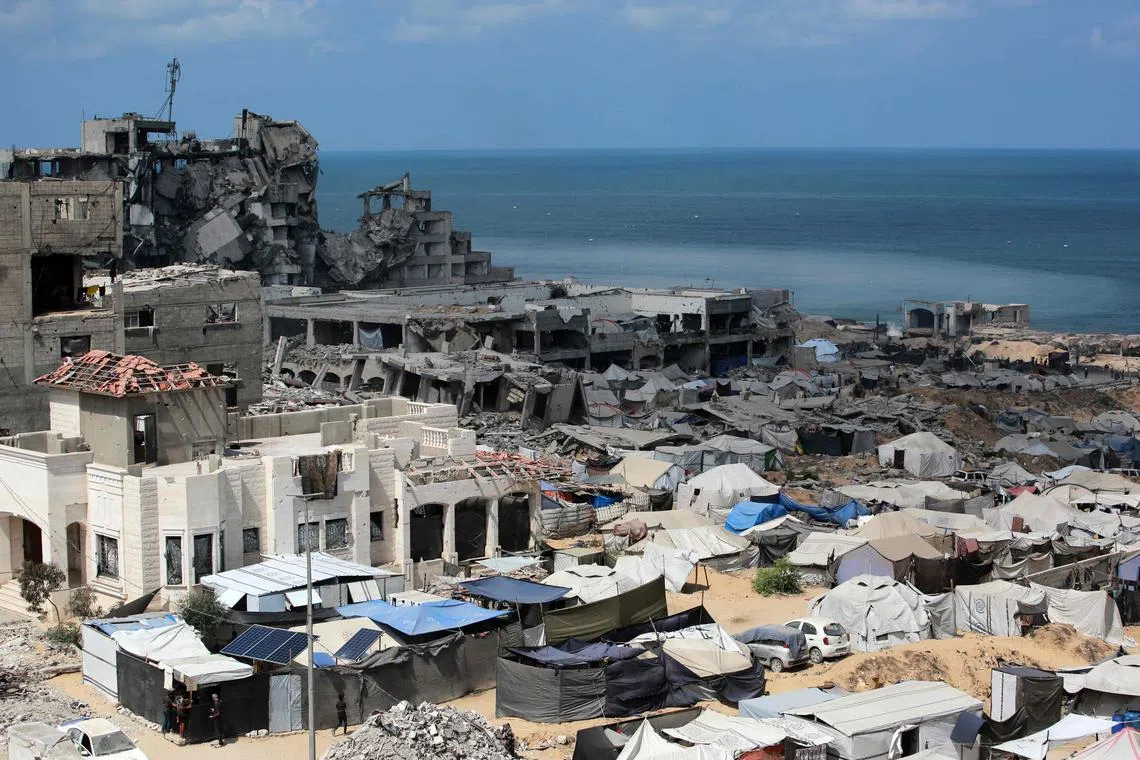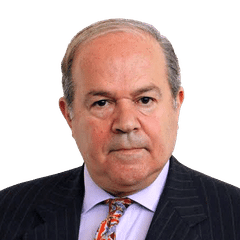Commentary
With Blair, the Kushners in the mix, will Trump’s plan to end Gaza war go beyond ‘Riviera’ fantasy?
Sign up now: Get ST's newsletters delivered to your inbox

A Gaza war diplomatic breakthrough does not seem imminent; Mr Steve Witkoff, the US President’s Middle East envoy, says fighting may not stop before “the end of the year”.
PHOTO: AFP
LONDON – Officials close to President Donald Trump claim that the US administration will soon unveil a plan to end the war in Gaza.
Washington is certainly buzzing with diplomatic activity. Israeli Foreign Minister Gideon Saar is in the US capital for talks with US Secretary of State Marco Rubio, his counterpart.
Mr Ron Dermer, Israel’s Minister of Strategic Affairs, who is Israeli Prime Minister Benjamin Netanyahu’s most trusted political fixer, is also in the US.
And Mr Trump chaired a meeting of his top security advisers at the White House
“It is a very comprehensive plan we are putting together,” Mr Steve Witkoff, the US President’s Middle East envoy, added in his media remarks.
Yet apart from rumours and conjecture, there are no details about what a US peace plan for Gaza may entail.
Nor does a diplomatic breakthrough seem imminent; even Mr Witkoff says that fighting may not stop before “the end of the year”.
The Israeli government remains undeterred by accusations that its “systematic obstruction” of the delivery of aid to the people of Gaza – as a UN agency put it – has resulted in a famine.
Mr Netanyahu has dismissed this as a “lie”, and the US has joined Israel in rejecting the United Nations’ famine determination.
Speaking before the UN Security Council on Aug 27, acting US Ambassador Dorothy Shea claimed that Israel had “enabled an unprecedented amount of more than two million tonnes of aid to flow into the Gaza Strip”, and called on the UN to stop “echoing false narratives”.
Still, the US is isolated on this matter even among its closest European allies. At the same UN Security Council meeting, British Ambassador Barbara Woodward called on Israel to “immediately lift restrictions and allow food, medical supplies and fuel to reach those in desperate need”.
Mr Trump may not personally care very much about the allegations of famine, but his diplomats clearly find their current position uncomfortable and are looking for a way out.
Furthermore, both Israel and the US know that unless there is some progress on the search for a diplomatic breakthrough over Gaza, some Western countries will recognise Palestine as an independent state over the next few weeks, as world leaders gather in New York in September for the annual meeting of the UN General Assembly.
There is also the looming Israeli threat of an all-out offensive on Gaza City, which the Israelis claim is the last redoubt of Hamas, the militant Palestinian organisation in control of the Strip. That could displace up to a million residents and unleash an even bigger humanitarian disaster.
And Mr Netanyahu is facing increasing domestic pressure to end the war. Opinion polls indicate that up to 80 per cent of Israelis now want a ceasefire and the return of the remaining hostages held by Hamas.
Demonstrations against the war are now back to an intensity not seen for a year, with hundreds of thousands marching against the Netanyahu government on the streets of Tel Aviv and Jerusalem, Israel’s biggest cities.
For all these reasons, both Israel and the US have an interest in being seen to be discussing possible diplomatic solutions. The snag remains, however, that all their supposed peace plans are either contradictory or unrealistic.
Mr Trump’s chaotic approach to governance means that nobody in the US has a complete understanding of what is being proposed and by whom.
Mr Witkoff, a real estate developer and a golf buddy, is Mr Trump’s most trusted negotiator with Israel. But Mr Witkoff has spent the last month dealing with Ukraine, so it is difficult to see what he brings to the latest Middle East discussions.
Meanwhile, there is Mr Kushner, who spends most of his time in the Gulf advising local sheikhs on how to spend their money, and Mr Charles Kushner, Jared’s father, who is now US ambassador to France, where he lectures the French government on how to deal with anti-Semitism and Israel. Both also influence Mr Trump’s views of the Gaza conflict.
And then, there is Mr Rubio, who runs the US’ diplomatic machinery but has little insight into what Mr Trump’s buddies may be saying, and no control over US Ambassador to Israel Mike Huckabee, who runs his own policy.
The involvement of Mr Blair only adds to this confusion.
Mr Blair, who drafted Gaza-related peace plans with the United Arab Emirates during the Biden administration, has now relaunched his efforts. On July 14, he met Palestinian Authority (PA) President Mahmoud Abbas.
The two appear to have discussed the possibility that the moderate PA – regarded by most countries as the official representative of all Palestinians – will replace Hamas in running Gaza, thereby fulfilling an Israeli pre-condition for any ceasefire.
Beyond this, however, nobody knows for sure what Mr Blair’s rumoured peace plan contains.
According to a variety of media leaks, the Blair plan seeks to further Mr Trump’s idea of transforming the war-destroyed Gaza into a seaside holiday resort
The construction of the so-called “Trump Riviera” will, allegedly, be aided by the “relocation” of half a million local Palestinians, who will be paid US$9,000 (S$11,500) each to move to other parts of the Middle East.
Newly built industrial zones will take their place, along with a free trade port and a network of artificial islands off the Mediterranean coast of Gaza.
It is hard to believe that anyone can take such plans seriously.
Still, fantasy proposals about holiday resorts among the rubble of Gaza allow Mr Netanyahu to avoid discussing the only peace plan that has a chance of working: an Egyptian proposal under which Israel would withdraw from Gaza completely and Egypt, together with Qatar, Saudi Arabia and the PA, would assume responsibility for the territory.
Mr Netanyahu hates this plan as it will also entail acceptance of the creation of an independent Palestinian state, something he is determined to prevent.
But unless Mr Trump exerts pressure on the Israeli leader to enter into serious peace talks, all the latest Washington discussions will come to nought.
Jonathan Eyal is based in London and Brussels and writes on global political and security matters.



